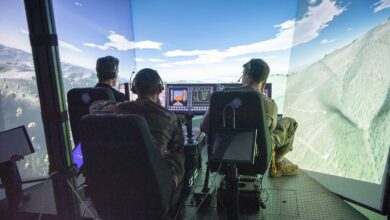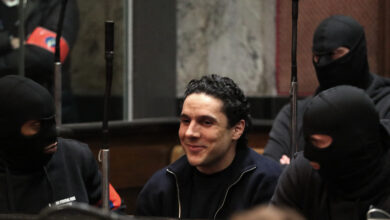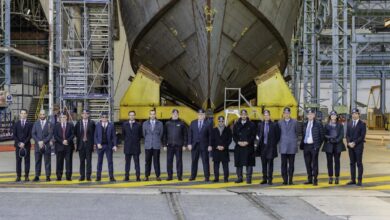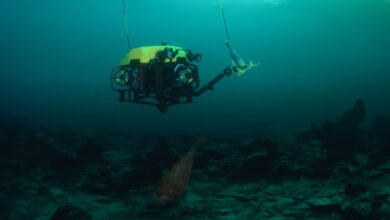France on Tuesday, December 11 handed over 1,400 AK-47 assault rifles and three amphibious vehicles to the Central African Republic to shore up its beleaguered armed forces.
French Defence Minister Florence Parly oversaw the handover at a ceremony at M’Polo military base in the capital Bangui.
French officials said the 1,400 guns are a gift.
The weapons handover comes in the same week as the mandate for Minusca, the United Nations’ peacekeeping mission in CAR, must be renewed.
The French military aid to CAR was announced by Foreign Minister Jean-Yves Le Drian in November, along with €24 million ($27.4 million) in civilian assistance. Le Drian said that the weapons would be supplied within a strict and transparent U.N. framework, adding that “it would be absurd to train soldiers and not to give them the means to perform their duties.”
The assault rifles were seized aboard a dhow off Somalia in 2016 that was intercepted for breaching an arms embargo with Yemen, AFP reported French officials as saying.
U.K.-based Conflict Armament Research, which works on the ground in active armed conflicts to document weapons at the point of use and track their sources back through the chains of supply, investigated the seizure by the FS Provence. In a November 2016 report, CAR said the seizure included 2,000 new-condition AKM-pattern assault rifles characteristic of Iranian manufacture and that the “weight of evidence” indicated that Iran was the likely source and Somalia and/or Yemen the intended destinations.

Arms transfers to Central African Republic
Thousands of people have died in CAR’s conflict, 700,000 have been internally displaced and another 570,000 have fled abroad since 2013, when the Seleka coalition of mainly Muslim rebel groups toppled longtime leader Francois Bozize, a Christian, who himself seized power in a coup.
Seleka was officially disbanded within months, but many fighters refused to disarm, becoming known as ex-Seleka. Many others joined the mainly Christian anti-Balaka militia to fight the Seleka, leading to a spiral of violence between groups along both religious and ethnic lines.
President Faustin-Archange Touadera’s weak government controls around a fifth of the country and relies heavily on Minusca for support. The rest is controlled by at least 14 different militia groups who often fight each other for control of revenue from extortion, roadblocks or mineral resources.
CAR’s armed forces (FACA) are just 7,000 strong in a population of 4.5 million, and they face at least 14 militia groups estimated to be at least similar in numbers.
FACA is also hampered by poor training and lack of equipment, the latter mainly due to a U.N. arms embargo imposed by the Security Council in 2013 and in January unanimously extended until 2019. The only exception is for the security forces with special pre-approval by a sanctions committee.
The embargo was last year lifted by the Security Council to allow delivery of 1,700 Russian weapons for FACA and again for the French shipment. The U.N. committee is tasked with ensuring that imported weapons do not end up in the hands of the militias in the corruption-prone country, and the U.N. has verified, with the defense ministry and Russia, weapons deliveries from Russia.
Russia’s Ambassador to CAR Sergey Lebanov said on September 17 that a second shipment of Russian arms and ammunition was “in preparation,” and would be delivered once approved by the Security Council.
France, Belgium, China and the U.S. have all recently supplied equipment for CAR’s military, but that equipment is understood not to include weaponry.
In June, France, the U.S. and the United Kingdom put a hold on a request from Central African Republic for U.N. Security Council approval of weapons shipments from China.

Training CAR troops
The European Union has trained more than 3,000 personnel to serve in FACA, although it is unclear how many have proper equipment. In July, the bloc extended EUTM-RCA until 2020, pledging €25 million ($29 million) to help reform the country’s defense sector. The scope of the mission was also modified to give strategic advice to the president’s cabinet, interior ministry and police, as well as the military.
CAR’s government aims to train around 1,300 troops annually through 2023.
More than 1,000 FACA personnel have completed Russian training programs in CAR, which they undertake after completing the EUTM-RCA program. They are trained by Russian instructors in the use of weapons before they are deployed.
Russian advisors also work with FACA and provide security and advice to Touadera. In August, Russia signed a military cooperation agreement with CAR offering the possibility for Central African officers and NCOs to be trained in Russian military schools.
France sees ‘no obstacle’ to ending UN arms embargo
Touadera reiterated a regular call for “the total lifting of the arms embargo that still weighs on our national army” in an address to the annual U.N. General Assembly in late September.
Parfait Onanga-Anyanga, the U.N. special envoy to the CAR, later said that the need for weapons was “undeniable” as the Central African Republic government builds its armed forces, but urged transparency in the flow of arms.
“China, but also the United States, have proposed new quantities of weapons,” Onanga-Anyanga said. “It’s for a good reason.”
“From France’s point of view, there is in principle no obstacle to ending the embargo” permanently, Parly said on Tuesday.
She stressed: “What is important is that these weapons, after they are delivered to the Central African armed forces, can be identified, stored and traced.”

Miniusca mandate to be renewed
The U.N. Security Council voted on November 15 to temporarily renew the mandate of the Minusca mission until December, amid heated debates about its ability to stem the unrest.
The vote came on the deadline for a renewal of the force’s mandate and amid wrangling over a resolution drafted by France that would see U.N. peacekeepers support newly-trained Central African troops as they deploy, supporting a “rapid extension of state authority over the entire territory.”
But agreement was reached over language that specifies that the new task given to Minusca will not lead to additional costs, AFP reported.
The French proposal raised eyebrows, in particular from the United States, which is seeking to streamline peacekeeping operations to reduce costs and make them more effective, diplomats said.
A new vote must be held before December 15.
With reporting from AFP












